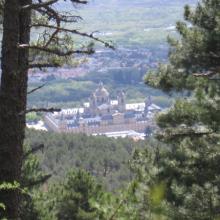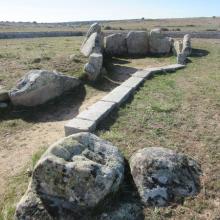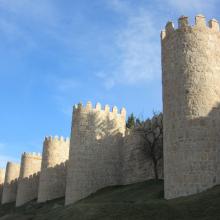This is a linear weekend route for cyclists accustomed to climbing mountains and pedaling along paths and open fields. We start at the El Escorial train station and the first day runs through the magnificent pine forests of the Malagón mountains, ending in Navas del Marqués. The next day we left the pine forests to climb along tracks, paths and open sheepfolds until we looked out over the city of Ávila. The descent along the north face takes us to another landscape, of pastures and rocks, which we cross pedaling along the Campo Azalvaro cycle track. Finally we say goodbye with a visit to the Bernuy-Salinero dolmen before seeing the majestic walls of Ávila.
Since 1984 the monastery of El Escorial, and since 1985 the walled city of Ávila have been World Heritage Sites.
This route runs through Campo Azálvaro-Pinares de Peguerinos, and the Guadarrama river basin, sites classified as SCI (Site of Community Importance); and the Campo Azálvaro-Pinares de Peguerinos, and the Holm oak groves of the Alberche and Cofio rivers, areas protected as SPA (Special Protection Area) in the Natura 2000 network.
Day 1.- Transportation to El Escorial. Pedaling from El Escorial to Navas del Marqués (40 km), through the Guadarrama river basin and the Holm oak groves of the Alberche and Cofio rivers. Visit to the Luis Ceballos arboretum. Lodging.
Day 2.- Ride from Navas to Ávila (45 km), through Campo Azálvaro-Pinares de Peguerinos. Visits to the Dolmen del Prado de las Cruces of Bernuy-Salinero, and the walls of Ávila. Transportation back home.
A free ebook with a lot of information: Ávila. El Valle del Alberche y Tierra de Pinares, by Lorenzo Gómez.
For reservation you should either call previously by phone to Josetxu (+34 644299532) or send us an email to info@bicicletos.org, to verify that there are still free places. We will send you a booking form and instructions for payment at that time.
Prices
(Final price may vary depending on the availability of accommodation and the update of rates of the different providers.)
Different route types are explained in General conditions.



